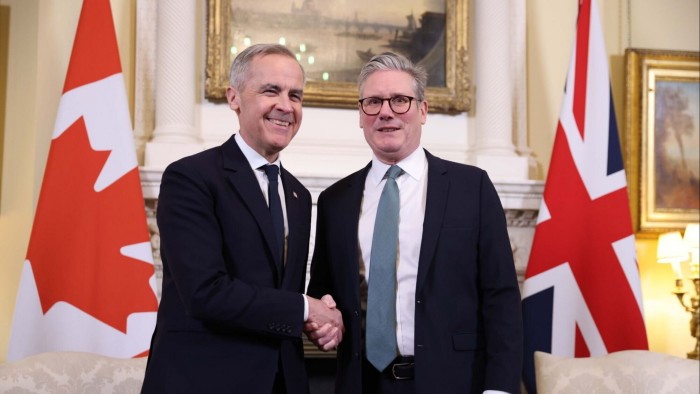This article is an on-site version of our Inside Politics newsletter. Subscribers can sign up here to get the newsletter delivered every weekday. If you’re not a subscriber, you can still receive the newsletter free for 30 days
Good morning. Former Bank of England governor Mark Carney has led the Canadian Liberals to a rare fourth-term victory — a result that will have an influence on political arguments here in the UK. Tell me what you think at the usual address.
Inside Politics is edited by Georgina Quach. Follow Stephen on Bluesky and X, and Georgina on Bluesky. Read the previous edition of the newsletter here. Please send gossip, thoughts and feedback to insidepolitics@ft.com
A new star and a warning
“These election results prove we should do what I wanted to do anyway” is one of the oldest cries in the book. Whatever happens in the English local elections on Thursday, the government will be pulled in two directions: one pole will be Labour’s performance against Reform, and the second, votes lost to the Greens and the Liberal Democrats.
The election results in Canada, where the Liberals under Mark Carney have won a fourth general election in succession are a reminder that elections are volatile. The Liberals were staring defeat in the face, third-party status or worse not so long ago. Now they are still in office with a new prime minister who will, I think, quickly become the progressive darling in much of the English-speaking world and will be a frequent talking point here about how Keir Starmer could be managing the Trump relationship differently.
There are a lot of ways to read this election and inevitably in the UK it will be used to argue a variety of narratives. This was in part an election about how Carney was able to revitalise a tired, flagging government and make it look new. But it was also about fear of Donald Trump and fear of opposition leader Pierre Poilievre: exactly the cards that Downing Street thinks it will be able to play against its rightwing challengers to scare voters back from the Lib Dems and Green tent.
The other reading, of course, is it shows the importance of having a robust, pro-globalisation, pro-openness, pro-liberalism message at a time when politics is increasingly being settled on that axis, but I don’t see much chance of that being taken up by this Labour government anytime soon.
On the Conservative side, in some ways, this ought to be a bad day for Robert Jenrick. For years he has been telling people that the Tory party needs to model itself on Pierre Poilievre, the now beaten leader of the Canadian Conservatives. But I suspect it will be Kemi Badenoch who is left with a Canadian hangover, because Carney’s heroics are a reminder of what a party can accomplish with a change of leader.
Now try this
I mostly listened to the terrific Endless Planets by Austin Peralta while writing my column this week.
Top stories today
-
Is populist support for Farage at its peak? | Nigel Farage tells the FT that while his previous political operations, namely the UK Independence party and the Brexit party, were set up to achieve “a very specific goal, which was to leave the European Union”, the project of Reform is “about taking government”.
-
Pension funds under pressure | Ministers are using strong-arm tactics to pressure pension funds to honour a proposed “voluntary” commitment to invest more in UK assets, industry figures have claimed.
-
Daddy cool | MPs have called on Rachel Reeves to extend statutory UK paternity leave, arguing that enhancing the offering for new fathers would increase female participation in the workforce and boost the economy.
-
Collision course | The government is clashing with trade unions over public sector pay, insisting there will be “no additional funding” for any rises above the 2.8 per cent recommended by independent pay review bodies.




